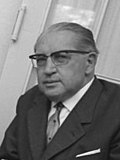Background
Bavaria was completely occupied by American troops at the end of April 1945. General George S. Patton appointed Christian democrat Fritz Schäffer as interim Minister-President on 28 May 1945, before being dismissed by General Dwight D. Eisenhower on 28 September 1945 due to Schäffer's past anti-Semitic positions, and hiring of ex-Nazis within his administration. [1]
The Ministry was then handed over to social democrat Wilhelm Hoegner, who oversaw the creation of a new Bavarian constitution in the spring and summer of 1946. To aid him, the Advisory State Committee was formed, with its members being appointed by the political parties or the state. The body was eventually dissolved, with direct elections being called for a Constituent State Assembly to oversee the passage of the Constitution. Thus, the first democratic elections were held in Bavaria since 1932. [2]
This page is based on this
Wikipedia article Text is available under the
CC BY-SA 4.0 license; additional terms may apply.
Images, videos and audio are available under their respective licenses.




